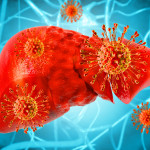People with HIV may take longer to develop hepatitis C virus (HCV) antibodies after becoming infected with the liver-damaging virus than HIV-negative patients, according to a study published in the January 2 issue of AIDS. The delay in antibody development lowers the number of HIV-positive patients who could be diagnosed during acute HCV infection, when treatment success rates are higher.
HCV is curable, but treatment success rates in people infected with both HCV and HIV are typically less than 40 percent. If doctors begin HCV treatment during the first few months after HCV infection, however, the chances of a cure increase substantially. In HIV-negative patients, the standard methods for detecting acute infection are the combination of elevated liver enzymes and a positive HCV antibody test.
To determine the most effective methods for diagnosing acute infection in HIV-positive patients, Emma Thomson, MRCP, and her colleagues from the Imperial College in London, examined blood samples from 43 patients from the St. Mary’s Acute Hepatitis C Cohort. Thomson and her colleagues checked the patients’ blood for levels of the liver enzyme alanine aminotransferase (ALT) and for the presence of HCV by polymerase chain reaction (PCR) test and an HCV antibody test.
Thomson’s team found that the HIV-positive men in the study had delayed development of HCV antibodies compared with HIV-negative patients. Most HIV-negative people will develop HCV antibodies within eight weeks of hepatitis infection, and nearly all have antibodies within six months of infection. Among the HIV-positive study volunteers, the average length of time to develop antibodies was three months, with two volunteers taking more than one year to develop antibodies.
PCR testing combined with ALT measurements offered a far more rapid and accurate method for detecting acute HCV infection, the authors concluded. In turn, they recommend PCR testing for HIV-positive patients suspected of acute HCV infection so that HCV treatment can be started quicker, affording a greater chance of treatment success.
Advertisement
Advertisement
Advertisement





Comments
Comments